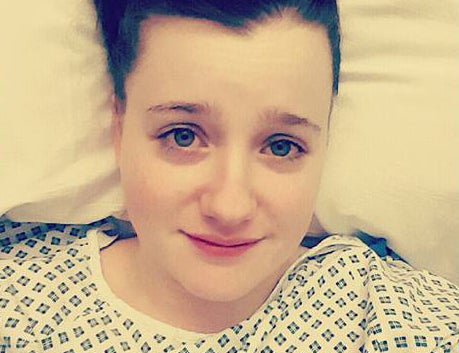I shared my symptoms of cervical cancer because at 24 it was thought I was too young to have it
If anything good came out of the heartbreaking diagnosis I received last year, it was the knowledge that I can now share

I was a 24-year-old young woman, living with my fiancé of seven years. We lived in a small cottage and were starting to planning our future together. Health-wise I was great. I ran every evening, did yoga, and was always full of energy.
It was around this time however when I started to notice bleeding between my periods. It was nothing major, and I put it down to my pill. Then I began to bleed after sex. When this happened I became worried so I took a trip to my GP and was told that I needed a smear, but I would need to be 25 to get one so was told to come back again when I was 25. With my worries put at ease I went on with life. But as time went by my symptoms became worse.
The bleeding became so bad that I had to return to my GP. I was told I was anaemic from the bleeding and was referred to a gynaecologist to find out why.
I met my gynaecologist and was told I may have some pre-cancerous cells on my cervix. I wasn’t too worried as I knew it’s not uncommon for a woman to visit a colposcopy clinic and have cells removed. The results came back and I was asked to return to the hospital for them.
This is when I began to worry. I was brought into a nice quiet little room with a couch and a box of tissues on the table. I told myself, "This is it - this is the room where people get given bad news."
Then the doctor said the words no one wants to ever hear: ‘’Heather, it’s cervical cancer."
It felt like the floor was gone from underneath me. I looked at my mum with her eyes beginning to fill with tears. My heart was broken, and all I could think about was my family. They didn't deserve this, to have to care for me through this awful experience.
I had an MRI scan so that a plan could be made for my treatment. The following week of waiting was the longest of my life. I couldn't eat or sit still. I just paced the floors, walking in circles. I walked miles every day to pass time, to try to tire myself out and to take my mind of it.
But nothing worked; nothing - of course - could take my mind off it. I couldn’t function, I couldn’t think straight. The doctor's words were on a loop in my head: "It's cervical cancer".
It was a very lonely time. No-one can really understand how you are feeling, and no-one knows what to say to someone who was just been told that they have cancer - so no-one was saying anything at all.
At night I would suddenly wake up shaking with cold sweats. It was like the opposite of waking up from a bad dream and telling yourself everything was OK. I was waking into a nightmare.
The decision was made that surgically removing my tumour would be the best course of treatment for me. It was done in a way that preserved my fertility, so that my partner and I could have children in the future. And four weeks after being told I had cancer, I was told it was gone.
Relief isn’t the word to describe how I felt. I had gotten my life back, my future.
The cancer I had was preventable through a simple test called a PAP smear. It takes 10 minutes in your GP's surgery, where you can be told if you have pre-cancerous cells. These can easily be burnt away before anything even begins.
These smear tests are free to all woman between the ages of 25 and 60. I wasn't offered a smear as I was not in the age bracket and the pre-cancerous cell changes were never picked up. Which is why it's so important for everyone to know the symptoms of cervical cancer:
- Abnormal bleeding between periods, after sex, or after menopause
- Foul smelling discharge
- Pain or discomfort in the pelvis or during sex
A smear can be requested from your GP if you under 25, but you will have to pay. In women under the age of 25, minor changes in the cells of the cervix are common but invasive cancer is extremely rare. Population-based screening in women under the age of 25 therefore may lead to many women receiving unnecessary treatment for lesions that would never have developed into invasive cancer.
But I hope my story will help others see the importance of going for smears - and listening to your body so that you know when something isn't right.
Join our commenting forum
Join thought-provoking conversations, follow other Independent readers and see their replies
Comments
Bookmark popover
Removed from bookmarks